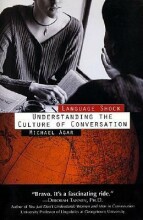Summary: Language Shock : Understanding The Culture Of Conversation | 9780688149499 | Michael Agar
- This + 400k other summaries
- A unique study and practice tool
- Never study anything twice again
- Get the grades you hope for
- 100% sure, 100% understanding
Read the summary and the most important questions on Language shock : understanding the culture of conversation | 9780688149499 | Michael Agar.
-
1 Cultural Blends
This is a preview. There are 7 more flashcards available for chapter 1
Show more cards here -
When can differences in interpreting happen?
Within languages as well as across them. -
How does the majority think languages are learned?
They assume that language instruction would solve the problem. They think that language is mostly grammar. Teach people the grammar, give them a dictionary, and they'll communicate. -
Where do most problems with language come from?
They aren't about sentences and parts of speech, but they have to do with wild herds of sentences, out on the open range. -
What do people usually think of culture?
They think of culture as something that a particular group of people have. Cultures roll around the planet like so many billiard balls, self-contained objects that might collide or bounce off the cushion but still retain their perfect round shape. -
When does culture start?
It starts when you realize that you've got a problem with language, and the problem has to do with who you are. It happens in language, but the consciousness it inspires goes well beyond it. -
What does culture change?
The natural or right meanings, the ones that tell you who you are and how the world works, turn arbitrary, one of a number of possibilities. Your natural language shines under the light of a new awareness; it blossoms into a fascinating complexity; you see possibilities you never imagined existed. Culture changes you into a person who can navigate the modern multicultural world. -
When can you use a new language?
You can't use a new language unless you change the consciousness that is tied to the old one, unless you stretch beyond the circle of grammar and dictionary, out of the old world and into a new one. -
Which two ways are there of looking at differences between you and somebody else?
- to figure out what the differences are the tip of the iceberg, the signal that two different systems are at work
- to notice all the things that the other person lacks when compared to you, the so-called deficit theory approach
-
What is the deficit theory?
They're the best, anything else is less than the best, and anyone who would call into question who they are when they're already the best is a fool or a masochist or even a Communist. It locks you into a closed room in an old building with no windows. It inoculates you against language, but you never communicate - except in terms of the world that shaped your attitudes, the language designed to fit your assumptions about what the world is and how it works, the native language you learned when you first stumbled around the house it diapers. -
Where are problems in communication rooted?
They are rooted in who you are, in encounters with a different mentality, different meanings, a different tie between language and consciousness.
- Higher grades + faster learning
- Never study anything twice
- 100% sure, 100% understanding
































